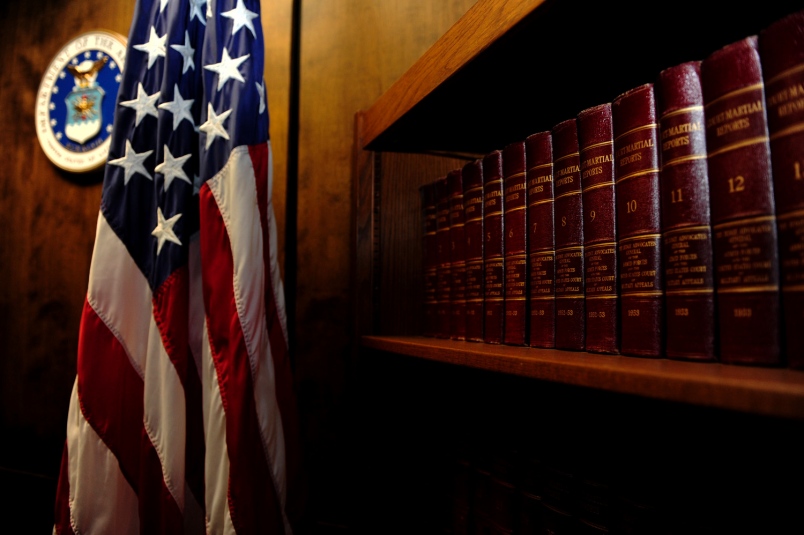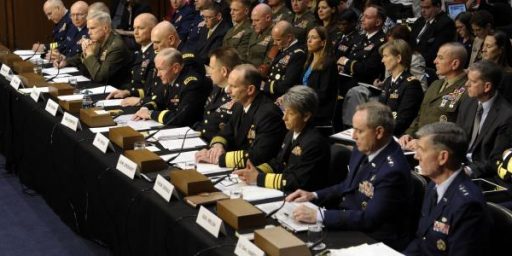Military Justice Reform Watered Down
The Pentagon brass have defeated a supermajority coalition in Congress.

WaPo (“Broad overhaul of military justice system being sidelined in favor of narrower focus on sexual assault“):
A widely popular proposal to force sweeping changes in how the military prosecutes felony crimes is likely to be left out of this year’s defense authorization bill, according to people familiar with the matter, ending for now what advocates called watershed legislation for equal justice in favor of a competing plan that focuses more narrowly on sexual assault and related offenses.
The proposal to establish an independent authority to determine when charges should be filed for numerous crimes was spearheaded by Sen. Kirsten Gillibrand (D-N.Y.). For years, she has promoted this approach as the best way to dissociate the military justice system from the biases of commanders and ensure crime victims — particularly women and minorities — cannot be silenced or denied justice by their superiors.
Gillibrand’s legislation struck a rare sweet spot in congressional politics this year, winning the support of most Democrats and a broad coalition of Republicans, and clear majorities in the Senate and the House. But last-minute procedural setbacks, coupled with resistance from the Pentagon, have sapped the momentum it previously enjoyed.
Based on more than a dozen interviews with senior officials and advocates familiar with private negotiations on Capitol Hill, it appears the Gillibrand provision, short of a miracle, is out. Those talks involve the top Democrats and Republicans on the Senate and House Armed Services committees. The senior officials familiar with their discussions spoke on the condition of anonymity because the $768 billion defense bill, which dictates funding for the Pentagon and other defense operations, has not been finalized.
In place of Gillibrand’s legislation, the defense bill is expected to incorporate an alternative proposal that will revolutionize how the military justice system approaches cases of sexual assault and certain related crimes, and which already received the backing of three-fourths of the House as part of its version of the defense bill, officials said. Charging decisions in those cases will become the purview of an independent special victims prosecutor, reflecting recommendations the Pentagon endorsed earlier this year. The final defense bill is also likely to designate the crimes of murder and kidnapping as falling under the authority of the special prosecutor, according to officials involved in negotiations.
I’ve been arguing for something in between these two proposals, but closer to Gillibrands, for many years. While initially skeptical, the issue of unlawful command influence ultimately persuaded me that military commanders simply can’t be trusted to handle sexual assault cases.
[M]ost of the public conversation on this topic has been focused on the wrong problem. While it’s true that some commanders have failed to vigorously do their jobs in prosecuting sexual assault as a serious crime, that’s fixable. The real problem is that commanders have two jobs here — sending the message that sexual assault will not be tolerated and prosecuting those who break the law — that are in conflict. Because the first of those jobs is essential to the commander’s role while the second can be done by objective outside professionals, the two must be split.
And, while sexual assault was the driving issue, I thought the solution needed to go further:
[T]aking felonies out of the UCMJ [is] imperative. For minor offenses — many of which aren’t crimes in the civilian world — the uniqueness of the military occupation, exigencies of location, and considerations as to whether an individual is otherwise a “good soldier” make the longstanding practice of commanders having a heavy influence vital for “good order and discipline.”
But felonies are a different matter. There, the aim is punishing transgression and separation of a bad egg from not only the military ranks but society at large. The civilian courts, lacking the conflict of interest inherent in military command, are simply the better venue for dealing with that.
Still, I’m skeptical that more than a handful of Senators have given any of this much thought.
Back to WaPo:
Gillibrand, in a statement, responded to questions about the potential demise of her legislation by emphasizing its broad backing in Congress. To excise it from the National Defense Authorization Act, or NDAA, as the larger bill is known, would be a “disservice” to military personnel, she said.
“Our reform has the bipartisan support of 66 senators and 220 House members,” Gillibrand said. “The only way it does not become law in the NDAA is if a handful of powerful men rip it out behind closed doors.”
If there are 20 Senators who could explain unlawful command influence or the difference between an Article 15 and a court-martial, I’d be pleasantly surprised. I guarantee you that there isn’t a majority, let alone a supermajority, who know enough about the issue to have an opinion. Honestly, this has mostly been Gillibrand’s baby, with a handful of other women in the Senate, notably Joni Ernst, taking an outsized interest.
Further, the fact that there were 66 Senators and only 220 Representatives should have been a red flag; the latter is barely a majority.
The campaign to improve crime victims’ ability to seek remedy through the military justice system dates back more than a decade. Most of the public debate has centered around correcting how the military prosecutes cases of sexual assault in particular, given the Pentagon’s own numbers show it is a rampant problem and there are anecdotal reports that thousands of cases go unreported.
But the debate about what reforms are necessary has been complicated by differences in Congress and within the military, many of them political and generational, about how to level the playing field for women and minorities, and disagreement over what lawmakers should — and should not — demand from the Pentagon.
Defense Secretary Lloyd Austin began the year by convening an independent commission to review how the military prosecutes sexual assaults. His and President Biden’s speedy embrace of its recommendations, including that prosecutors outside the chain of command determine when such sexual assault charges should be filed, wasacknowledgment that the problem needed fixing.
The congressional debate grewcomplicated in the last few weeks as the Senate defense bill — which contains Gillibrand’s legislation — hit what are amounting to insurmountable roadblocks. Now, there is a race against the clock as lawmakers rush to get a defense bill to Biden’s desk before the end of the year.
The breakdown has occurred over two main points: how many types of offenses should fall under the new special prosecutor’s purview and who, ultimately, is responsible for convening the courts-martial that will hear the cases at trial.
Gillibrand’s proposal puts charging decisions for nearly any crime that is not exclusive to the military and carries a potential maximum sentence of over a year in prison into the hands of a special victims prosecutor. It has the support of House Speaker Nancy Pelosi (D-Calif.) and Senate Majority Leader Charles E. Schumer (D-N.Y.), who has told Pelosi he wants to see it in the final defense legislation, according to a person familiar with their discussions.
But people involved in the negotiations said that congressional leaders are homing in on a narrower roster of crimes. There are competing explanations as to why. Those who support the more limited approach argue that renegotiating the list could threaten the balance of the entire defense bill. Those who support a more aggressive approach argue that the resistance is born of cowardice and a reluctance to stand up to pressure from the Pentagon not to push military leaders where they don’t want to go.
For reasons good and bad, the military brass is accorded deference by Congress in a way that no other bureaucratic experts enjoy. The Supreme Court, too, has a very long history of bowing to claims of military “good order and discipline” as trumping even Constitutional guarantees. So, I would imagine that lots of folks who had initially agreed to sign off on these proposals backed down in the face of Pentagon opposition, given that they didn’t have a well-grounded opinion to begin with. When the generals say a proposal will be harmful to the functioning of the armed forces, most Congressmen are unlikely to push back too hard.
Gillibrand and her partners are upset that negotiators have embraced the House bill’s approach of letting commanders continue convening courts-martial, distrusting the House proposal’s stipulation that the special prosecutor’s “binding” charging decisions will be enough to prevent cases from being drawn out. Instead, they want to create an entirely separate courts-martial convening authority, though it would be left to the individual service chiefs — the generals and admirals who lead the Army, Navy, Air Force, Marine Corps and Coast Guard — to determine what that should look like.
The dispute has exacerbated tensions within the community of lawmakers advocating for sexual assault reforms. Leading House Democrats say their version is not only sufficient but better than Gillibrand’s, in certain respects. Officials point out that only their approach makes sexual harassment a punishable crime and that, overall, it is more specific in its instruction to the Pentagon.
“Only the House bill ensures true independence by establishing an Office of the Chief Special Victim Prosecutor in each military department that would be under civilian control, not under the judge advocate generals who … have been quietly lobbying Congress to water down the House bill,” said Rep. Jackie Speier (D-Calif.), chief architect of that chamber’s military sexual assault legislation, who, like Gillibrand, is a longtime critic of the Pentagon’s existing approach to prosecuting sexual assaults.
Commanders, Speier added, would have “no meaningful role” in convening the courts-martial — and would be subject to discipline themselves if they don’t heed the special prosecutor’s charging decisions.
Members of the Congressional Black Caucus, in particular, have urged Pelosi and Smith in recent days to put more crimes under the special prosecutor’s purview. At a minimum, they want to see larceny, robbery and assault charging decisions added to the list.
“Those crimes, like stalking and like kidnapping, are often associated in these special victims scenarios,” Rep. Anthony G. Brown (D-Md.) said in an interview. And, he added, “this is where you really begin going after the racial and ethnic disparity.”
Black and Brown service members tend to be disproportionately court-martialed for disputes involving alleged theft or fights compared with their White counterparts, minority lawmakers have argued. The Pentagon does not collect such data, but a separate provision in the House legislation aims to change that. Putting such cases in the hands of a special victims prosecutor, they contend, is the only way to guarantee that commanders — who are disproportionately White — do not perpetuate such bias.
Congressional Black Caucus members have the backing of sexual-assault-reform advocates, who say that it is better for the military to address prosecutorial discrimination in all forms. Otherwise, many advocates for broader reforms fear that singling out sexual assault — where the victims are disproportionately women — could lead to more institutional bias.
Again, these are people interested in the reform for reasons other than an understanding of how the military justice system actually functions. It makes for a very weak coalition in the face of concentrated opposition from the stakeholders.





In other military news Atrios quotes a whistleblower saying the Army is lying to cover up the role of Gen. Charles Flynn and others in the delayed National Guard response to the 1/6 riot.
@gVOR08: Oh great. More good news and cover ups.
40 years ago, I knew a promising young officer whose career was dumped straight into the toilet after her testimony in the court-martial of her commander’s adjunct (I believe that’s the correct term). After her testimony, she was told that she’d never rise above captain, and would never receive a posting that wasn’t a hardship posting. Sadly, it took her 12 more years (and some postings in truly awful places, all overseas) before she acknowledged that truth and retired. But she retired at the rank of Major.
In an ideal world, the military would train and promote senior officers who would process criminal activity judiciously and fairly. Unfortunately, we don’t live in an ideal world. So I’ve come around like James and now believe this is necessary for some crimes.
Additionally, a lot of the reasons why this command authority originally existed simply are not relevant today.